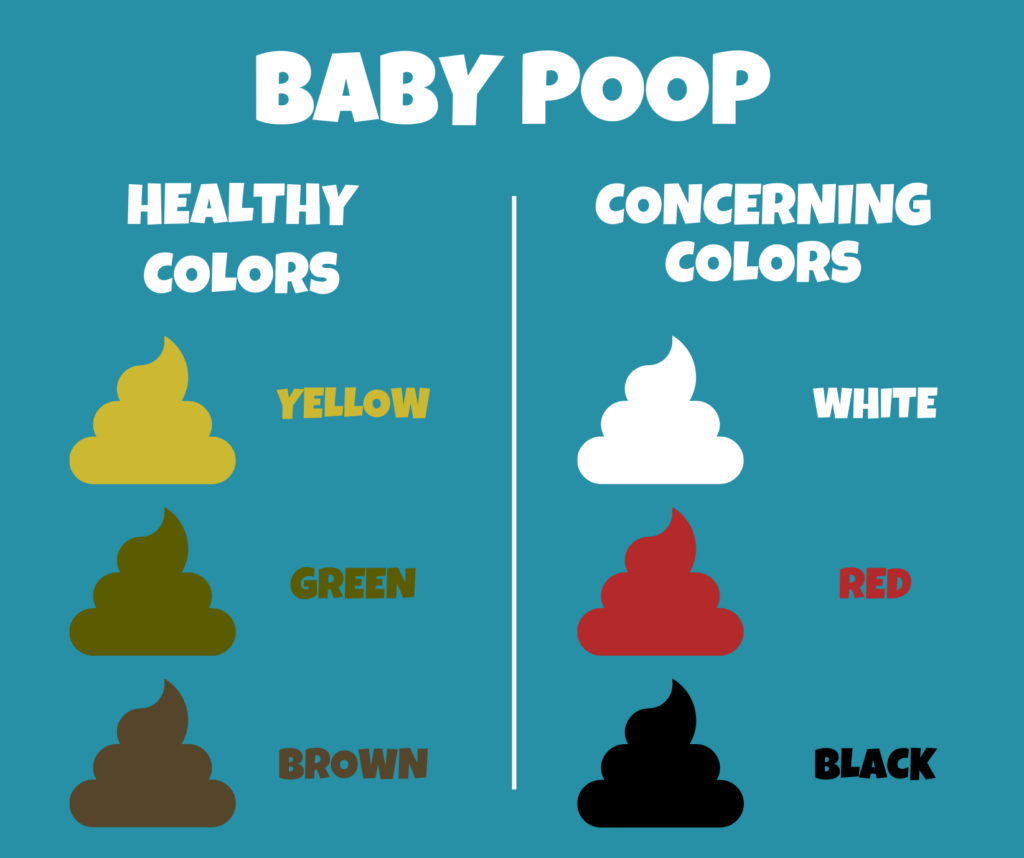In your baby’s first years, their poop changes a lot, so you are going to see a wide range of what is “normal.”
But since your baby can’t talk and tell you when they aren’t feeling good, their poop is one way to gauge if they are having any health issues.
We’re going to go over what’s “normal,” how your baby’s stools may change, and what signs to watch out for.
Normal Baby Poop

Normal baby poop can vary in color, consistency, and frequency, depending on the baby’s age and diet. The general rule is if your baby’s poop is an earth tone, like yellow, tan, brown, or green, it’s a normal color.
When your baby is first born, their first few bowel movements will be black as they pass meconium, a thick, dark greenish-black substance. After the meconium clears out, your baby’s poop will become more earth toned.
As your baby starts breastfeeding or formula feeding, their poop will transition to a yellowish color and may have a more seedy texture.
- Breastfeed babies: Typically have stools that are mustard-yellow and loose
- Formula-fed babies: Typically have stools that are slightly firmer and tan in color with hints of green
Any time you change what your baby eats, or if they take medicine, it can change the color and consistency of their poop.
If you transition your breastfed baby to formula or to cow’s milk, you can expect your baby’s poop to be slightly firmer and to be more brown.
As you introduce solids, your baby’s poops will reflect more of what they ate. You may find bits of undigested foods, their poop will be more firm, and the colors may change based on what they ate.
How often should my baby poop?
The frequency of bowel movements can vary widely in babies. Some babies have a bowel movement after every feeding, while others may go a day or more between bowel movements.
Breastfed infants often poop more frequently, sometimes after every feeding, while formula-fed infants may have slightly less frequent bowel movements.
As babies grow, their bowel movements timing will change. Newborns tend to poop more often, where you may feel like all you do is change diapers. As they grow, their pooping pace will slow down.
What’s important is to focus on what’s normal for your baby.
If there’s a change, such as you baby’s poops turning more watery or they are pooping more often they are eating, they might have diarrhea. If your baby has gone more than 5 days without pooping, or are struggling to have a bowel movement, they might be constipated.
In those cases, you should contact your provider at Pediatrics West for medical advice.
Unusual Baby Poop Colors
Just like with adults, babies can have changes in their poop based what they are eating or if they are sick. But if your baby has poop that is black, red, or white, it can be a cause of concern.
If your baby has more than one bowel movement that is black, red, or white, you should consult your provider at Pediatrics West.
Black Poop: Not to be confused with dark green (it’s still considered green), black poop can signal bleeding in the intestinal tract. Keep in mind the black meconium poop after birth is completely normal.
Red Poop: Red can also mean blood, but it should not cause you to panic immediately. In most cases, poop that is red is often caused by red foods (like beets), food coloring, or red medicines.
White Poop: White poop is rare, but can be a sign your baby is not digesting food properly and has an underlying liver problem.
Contact Pediatrics West
If you have any questions or concerns about your baby’s bowel movements, contact your provider at Pediatrics West via MyChart or by calling (720) 284-3700.


